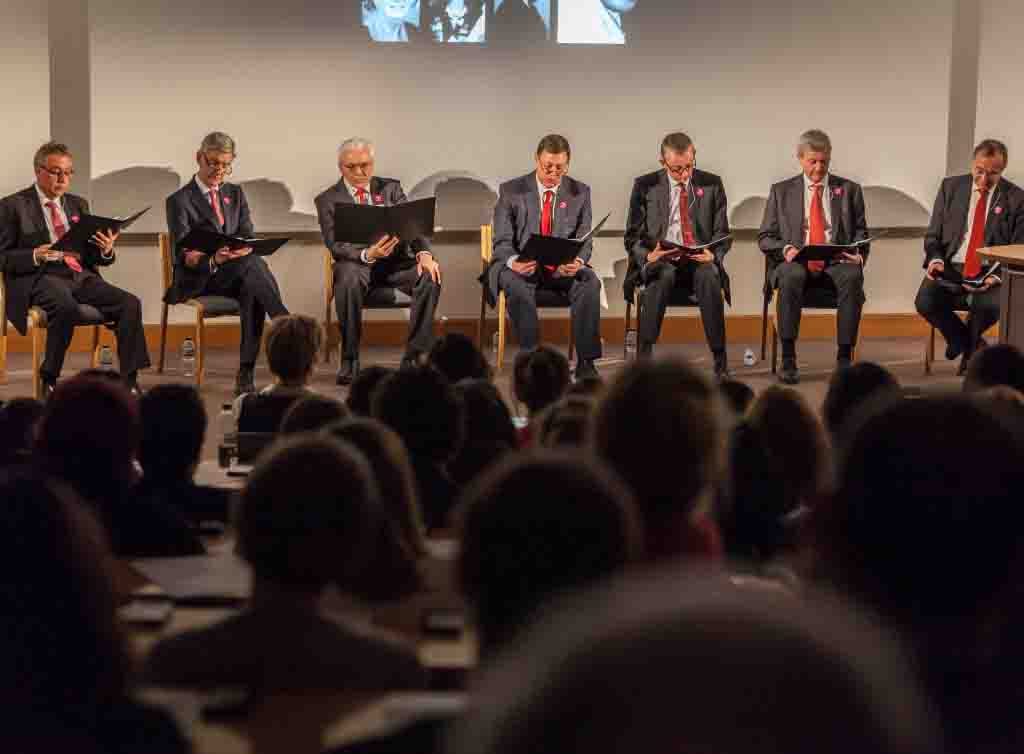SEVEN the play
By Siobhan Pipa, on 11 March 2015

Professor Peter Brocklehurst at SEVEN
(Courtesy of Ben Sharman)
As part of a series of events to celebrate International Women’s Day at UCL, the UCL Institute for Women’s Health put on a special production of SEVEN – a documentary play based on the lives of seven inspirational women from seven countries around the world.
Presented as a reading, seven of the most senior men at UCL lent their voices to the female activists: Professor Michael Arthur (UCL President & Provost), Professor Sir John Tooke (Vice Provost, Health and Head of UCL School of Life & Medical Sciences), Professor David Lomas (Vice Provost-elect, Health and Dean of Medical Sciences), Professor Anthony Smith (Vice Provost, Education & Student Affairs), Professor Alejandro Madrigal (Pro Vice Provost for the America’s), Professor Peter Brocklehurst (Director, UCL Institute for Women’s Health) and Professor Anthony Costello (Pro Vice Provost for Africa & the Middle East and Director of the UCL Institute for Global Health).
The play, which was directed by Tove Eriksson and organised by Asma Ashraf and Professor Judith Stephenson (UCL Institute for Women’s Health), depicts how these women overcame extreme adversity to become leaders for women’s rights, both within their own society and globally.
One of the women depicted is Mukhtar Mai from Pakistan – who in 2002 was brutally raped by four men and forced to walk home almost naked as retribution for an alleged “honour crime”. Mukhtar’s story gained international coverage when, instead of committing suicide – the traditional women’s route with such crimes, she defied convention and brought charges against her rapists.
Listening to Mukhtar’s story being read aloud genuinely is a heart breaking experience – hearing it read by the Provost in a lecture theatre at UCL is in stark contrast to the horrors she faced. However it’s not the attack itself which forms the main focus of Mukhtar’s story in SEVEN, rather it’s what she did after.
And it’s this focus beyond the terrible events faced by these women that makes SEVEN so powerful. Society, and the media, can often become fixated with the idea that people who survive violence are victims – this play’s strength comes from its ability to look beyond this and focus on how these women have become leaders and outspoken activists.

The cast of SEVEN
(Courtesy of Ben Sharman)
Their stories really reminded me that women’s rights are not issues restricted to one social, economic or political group. The women featured come from a wide range of backgrounds and their stories are all individual.
They should also not be issues championed solely by women for women and having seven of the most senior men at UCL reading out the performance is pertinent. It’s a contrast that should make us consider the role both genders can play in improving the lives of women internationally. And perhaps more locally – what UCL itself can do.
There is a startling gender divide in the number of women in top positions in higher education – only 22 per cent of professors in the UK are female – and although UCL has 278 female professors, the highest number of any university in the UK, it’s impossible to deny that it is still a concern.
Following the performance the discussion was opened up to the audience and the lack of women in senior management positions at UCL was a key topic.
Acknowledging that there is a problem is a step in the right direction, and as Professor Arthur pointed out, the solution isn’t as simple as hiring more female professors – making the gender split equal would involve firing 400 male professors.
With UCL often being credited as the first university to accept women on equal terms with men, it’s events like this that challenge us to re-examine the impact UCL can have, both academically and practically, in raising the political and social awareness of women’s rights.
 Close
Close

